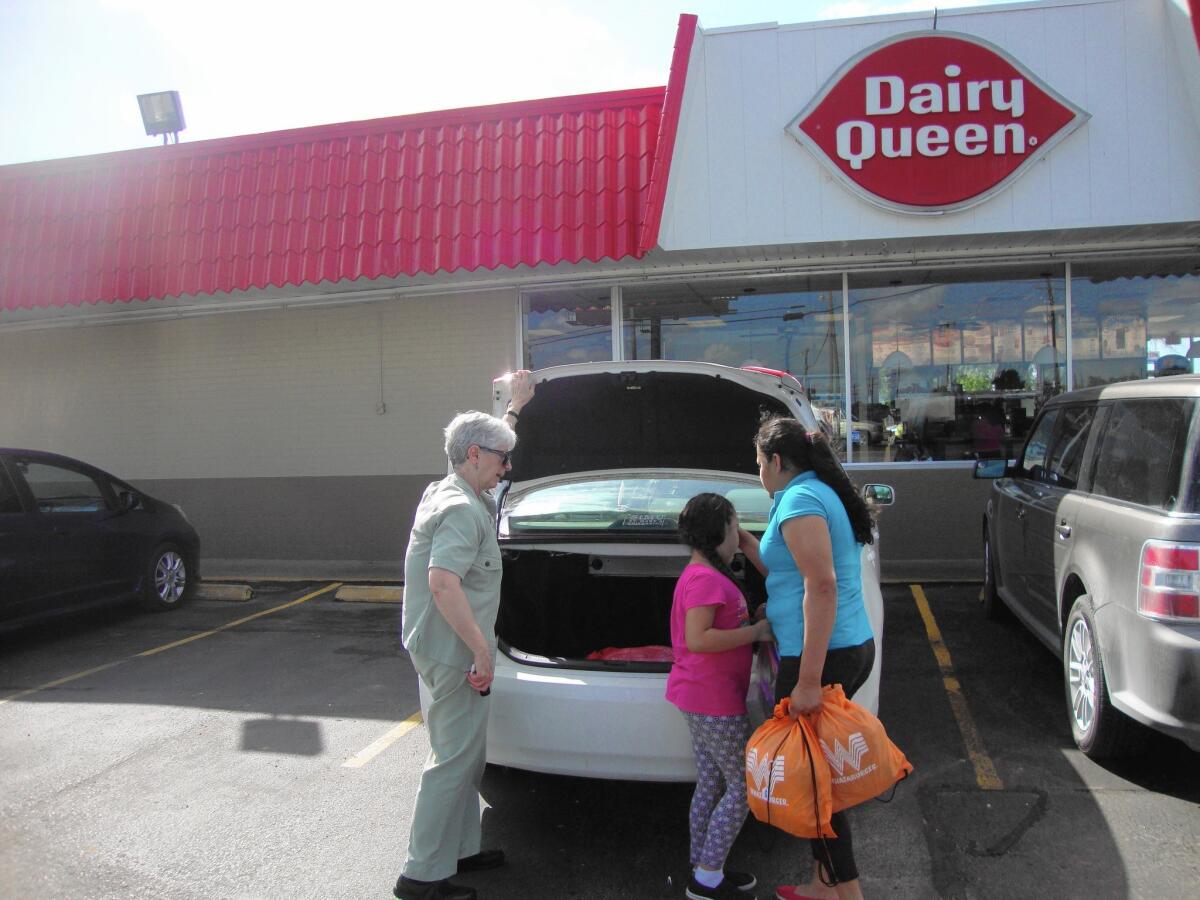Great Read: A Texas nun greets detained immigrants at the gate to freedom

- Share via
Reporting from Karnes City, Texas — Sister Sharon Altendorf waits for hours in the bare lobby. A television blares Muzak and flashes photos of employees of the month. Nearby, a guard keeps watch next to a metal detector.
The nun sits in a plastic chair, a diminutive figure beneath the harsh fluorescent lights. She is instantly recognizable with her cross earrings, short gray hair, mint green pantsuit and sensible black shoes. Fellow volunteers — drawn by the plight of immigrant mothers to this rural outpost amid the oil fields — make their way across the gleaming linoleum to greet her.
Workers call this place a residential center for immigrant families.
“The kids really have a hard time here,” the nun once told a staffer.
“Why?” the staffer asked. “They have everything they want.”
“It’s a prison,” she said.
The center is run by the nation’s second-largest corrections company.
Today, Sister Sharon is here for Karen, a 25-year-old Salvadoran mother who illegally crossed the border 11 months ago with her daughter, Joanna, now 8, to work and pay for her mother’s breast cancer treatment.
Karen, who asked to be identified only by her first name because her immigration case is pending, is being freed from the Karnes County Residential Center on $1,500 bond, although there is no sign yet of her or Joanna.
“There’s nothing you can do but wait,” the nun says. “That’s what we do and what they make us do all the time.”
Waiting is woven into life here at one of the nation’s largest immigrant family detention centers.
The center and another about 95 miles west in Dilley opened last year to house an influx of immigrant families from Central America that overwhelmed the Texas border. The U.S. went from one 95-bed center in Pennsylvania to three and by year’s end will have 3,700 beds.
But even as the Obama administration has expanded family detention, Sister Sharon and other opponents have scored victories.
Last month, Homeland Security Secretary Jeh Johnson announced plans to speed the release of immigrant families who pass initial asylum screenings.
Last week, a federal judge in Los Angeles sided with immigrant children’s attorneys and ordered the administration to show by Monday why she should not end family detention.
On the day Sister Sharon visits the center to pick up Karen, 2,172 mothers and children remained locked up, 122 of them at the Karnes detention center.
Some have been held for nearly a year, and it is left to volunteers like Sister Sharon to be a constant in their lives, to help them survive the uncertainty.
As Karen once told her: “Your presence is important to me, just that you come … that we’re not forgotten.”
::
Sister Sharon, 70, first met immigrant families when she was growing up near the Canadian border in a North Dakota farming town.
They were Spanish-speaking migrant workers from Mexico as well as California, Michigan, Oklahoma and Texas. She had not learned their language yet, so she accompanied a pastor to visit the workers and their families at their homes, at fiestas and Spanish-language Masses.
After she became a Presentation Sister, an order dedicated to serving the poor, she worked for 14 years in Peru, becoming fluent in Spanish, and then eight years at the United Nations.
Three years ago, she moved to San Antonio to work with immigrants. As soon as she heard children and families were being detained last summer, she started visiting them: first unaccompanied children, then women — so far more than 15.
“I believe in having two feet in anything,” Sister Sharon said. “I wanted to really feel the heart of people I was working with.”
Dozens of volunteers regularly make the hour’s drive south here from San Antonio.
Some are affiliated with the San Antonio-based Interfaith Welcome Coalition, a group of churches that united to help the immigrant families. They visit them in detention, ferry them to the bus station, find them lawyers and hand out donated supplies, packed in orange Whataburger bags.
The nun has been waiting at the detention center for more than two hours when a group of pro bono lawyers arrives. They deposit their cellphones in lockers and pass through the metal detector.
Sister Sharon stirs a bit as a voice on the public address system announces Mass in Spanish, then summons several women for visits. Karen is not among them.
The nun first went to see Karen in October, after another detained mother told her Karen wasn’t getting any visitors. Karen doesn’t speak English and was grateful for a Spanish-speaking friend.
“It was just the fact that she knew somebody was going to come, once a week, and whatever she wanted to talk about, I was there,” the nun said. “You feel so isolated from the world.”
As they became acquainted over the months, Karen opened up to the nun, putting her in touch with her lawyer, her mother and the father of her daughter.
In the spring, Karen joined other detained mothers in a hunger strike demanding improved conditions. Now it was June, and some hunger strikers were being released or deported before a visit by Homeland Security chief Johnson and a congressional delegation opposed to family detention.
Karen was told two days earlier she would be freed. Volunteers arranged for her and her daughter to stay with a host family in the Panhandle town of Amarillo and bought them Greyhound bus tickets. But their release was delayed. Sister Sharon last spoke to Karen by phone that morning.
“I hope she knows, because when she called me she was desperate. She said, ‘Get here as early as you can,’” the nun says.
She checks in again with the guard, who encourages her to go get lunch. But there isn’t anywhere to go nearby. Sister Sharon ducks out into the afternoon heat and grabs a cereal bar from her white Toyota Camry. In her trunk, she has gifts: backpacks of supplies and snacks.
At 2 p.m., the nun lingers near the metal detector, scanning the hall.
“I’m anxious,” she says.
Just then, Karen appears in a turquoise T-shirt, jeans and cheap blue rubber slip-ons that have split across her toes. She carts her belongings and paperwork in a red plastic vegetable sack. Her daughter clings to her side. The trio embrace, and head for the double glass doors.
A guard stops them. Karen still needs to complete an exit interview, he says, and the mother and daughter wait in their short-sleeved tops in the chilly, air-conditioned lobby.
“I can’t believe I’m out,” Karen says.
Sister Sharon smiles.
“You’re not dreaming,” she says. “Now that you’re out, what do you want to do?”
Karen thinks before answering.
“When I was there, I imagined so many things.”
She is thankful. She ticks off the holidays they have spent in detention: birthdays, Christmas, Mother’s Day. No more.
Joanna yawns, snuggling her French braid into her mother’s side and linking arms. She left her favorite doll behind in her room: Elsa, the Disney princess from “Frozen.” It was a gift from another volunteer, a friend of Sister Sharon. The guard says they can’t go back for it.
“We can leave it for the others,” her mother says.
Finally, the guard escorts them to the exit interview. At 3:30 p.m., five hours after Sister Sharon first arrived at the center, the mother and daughter are free to leave. They speed outside with the nun, and the hot air hits them like a sauna.
Karen closes her eyes and soaks it in. “La libertad,” the nun says, and Karen repeats after her, like a prayer. The Salvadoran mother opens her eyes and takes in the cow pastures, oil derricks and dusty roads.
Karnes City lies at the heart of the state’s Eagle Ford shale fracking boom, its roads frayed by industrial traffic and flanked by hastily built trailer camps and businesses. Karen says it doesn’t look that different from her hometown in El Salvador.
She stops behind the nun’s car to change into a pair of new pink slip-ons. A guard patrolling the lot pulls up.
“Take care,” he says, smiling as Karen thanks him and climbs into the car.
They head to a Dairy Queen for chocolate sundaes, which Karen pronounces “delicious.”
She hated the food at the detention center — flies on the spaghetti, stale ham sandwiches. Joanna always had a stomachache.
They check the bus schedule and find one leaving San Antonio at 10:30 p.m., arriving in Amarillo at 11:30 a.m. the next day. They swing by Wal-Mart to get a duffel bag, a “Frozen” T-shirt for Joanna and a sequined top for Karen.
Joanna throws up twice in the car, her stomach still unsettled.
She is still recovering when they stop at the Casa de Maria y Marta Mennonite shelter. Karen recognizes the cook, a former detainee who greets her warmly and offers a dinner of chicken, rice and beans.
It is dark by the time they reach downtown San Antonio. They cruise through the bustling Alamo tourist district, past cypress and palm trees strung with glittering lights and over arched stone bridges spanning the River Walk. Tourists glide by on boats and in horse-drawn Cinderella carriages that look to Karen like something from a Disney movie.
The Greyhound station is at the edge of downtown, aglow with fluorescent lights, bicycle police and security guards patrolling rows of metal seats packed with families, students, soldiers and panhandlers.
The nun explains to Karen that she will have to change buses in Dallas, then stay on board during stops in Austin and Wichita Falls. Karen says she understands.
Sister Sharon watches the mother and daughter get on the bus. Karen promises to call from Dallas. The nun isn’t too worried.
“They’re streetwise,” she says. “They came all this way.”
Sister Sharon waits until the bus pulls out before setting off alone into the night. Tomorrow, she will find another family to visit.
Twitter: @mollyhf
More to Read
Sign up for Essential California
The most important California stories and recommendations in your inbox every morning.
You may occasionally receive promotional content from the Los Angeles Times.











